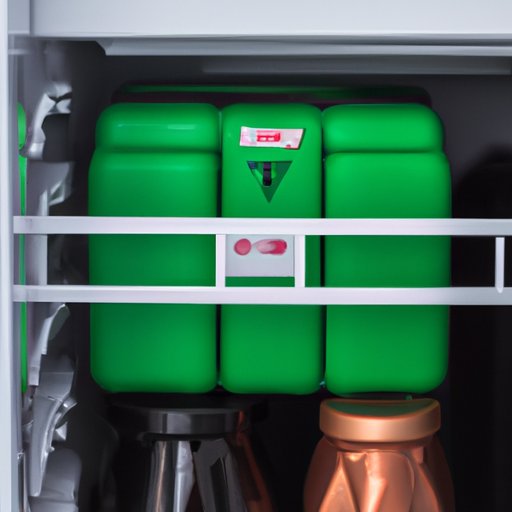Introduction
Are you wondering if you should store your batteries in the refrigerator? Is it safe to do so? How does keeping them cool affect their lifespan? This article takes an in-depth look at the pros and cons of refrigerating batteries, so you can make an informed decision about how to store them.

How Storing Batteries in the Refrigerator Can Help Them Last Longer
Refrigeration is beneficial for battery storage because it helps reduce the rate at which batteries lose their charge. Batteries naturally discharge over time, but this process is accelerated when they are exposed to heat. By keeping them cool, you can slow down the rate of discharge and extend the life of the battery.
The benefits of keeping batteries cool include improved performance and longer shelf life. Batteries stored in the refrigerator will retain their charge for a longer period of time, allowing them to be used more effectively. They also have a longer shelf life, meaning they can be stored for extended periods without losing their charge.

The Pros and Cons of Keeping Batteries in the Fridge
There are both pros and cons to storing batteries in the refrigerator. On the plus side, refrigeration can help extend the life of batteries and improve their performance. However, there are some potential drawbacks to consider as well.
Pros
- Batteries can last longer and perform better when stored in the refrigerator.
- Refrigerated batteries have a longer shelf life.
- Batteries are protected from extreme temperatures and environmental factors.
Cons
- Batteries can be damaged if stored at too low of a temperature.
- Batteries must be monitored to ensure they are stored at the correct temperature.
- Batteries require special packaging to prevent damage or leakage.
Is Refrigeration Necessary for Battery Storage?
Not all types of batteries need to be refrigerated in order to maintain their charge. Some batteries, such as alkaline and lithium-ion, can benefit from refrigeration, while other types, such as nickel-cadmium, do not need to be chilled in order to remain effective.
Types of Batteries that Benefit from Refrigeration
- Alkaline batteries
- Lithium-ion batteries
- Nickel-metal hydride batteries
Types of Batteries That Do Not Need to Be Refrigerated
- Lead-acid batteries
- Nickel-cadmium batteries
- Silver-oxide batteries
What Are the Risks of Storing Batteries in the Fridge?
Although refrigeration can help extend the life and performance of batteries, there are some potential dangers to consider. The most important risk to be aware of is that batteries can be damaged if stored at too low of a temperature. If the temperature inside the refrigerator drops too low, it can cause the battery to freeze and become damaged.
In addition, batteries stored in the refrigerator must be closely monitored to ensure they are stored at the correct temperature. If the temperature fluctuates too much, it can cause the battery to overheat and become damaged.
Finally, it is important to use the proper packaging when storing batteries in the refrigerator. Batteries must be sealed tightly to prevent leakage or damage, and they should never be stored near food or beverages.
How Cold Should I Keep My Batteries?
The optimal temperature for battery storage is between 35-45°F (1.7-7.2°C). Any colder and the battery could freeze, any hotter and it could become damaged. It is important to monitor the temperature inside the refrigerator to ensure the batteries are being stored at the correct temperature.
Tips for Safely Storing Batteries in the Refrigerator
If you decide to store your batteries in the refrigerator, there are a few safety precautions you should take. First, be sure to use the proper packaging to prevent leakage or damage. Second, monitor the temperature inside the refrigerator to ensure the batteries are being stored at the correct temperature. Third, keep the batteries away from food and beverages to avoid contamination.
It is also important to inspect the batteries regularly for signs of damage or leakage. If you notice any of these signs, replace the batteries immediately.
Conclusion
Storing batteries in the refrigerator can help extend their life and improve their performance. However, there are some potential risks to consider, such as damage caused by too low of a temperature or leakage due to improper packaging. It is important to monitor the temperature inside the refrigerator and use the proper packaging to ensure the batteries are stored safely and securely.
In conclusion, refrigeration can be beneficial for certain types of batteries, but it is not necessary for all types. Be sure to research the type of battery you are using and determine whether or not refrigeration is recommended before attempting to store your batteries in the refrigerator.


